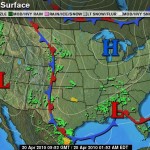 The people of the ancient world viewed the cosmos as three levels, or tiers: the heavens, the earth, and…the underworld (cue spooky music). Climate came from up above, and the expanse (the firmament, in old language) regulated things such as precipitation and sunlight. The role of the expanse was to manage the weather. The point of “Day Two” of creation was the God was responsible for an operational weather system.
The people of the ancient world viewed the cosmos as three levels, or tiers: the heavens, the earth, and…the underworld (cue spooky music). Climate came from up above, and the expanse (the firmament, in old language) regulated things such as precipitation and sunlight. The role of the expanse was to manage the weather. The point of “Day Two” of creation was the God was responsible for an operational weather system.
The writer is using the colloquial language of appearances (waters above, waters below, expanse, firmament) rather than the kind of technical scientific language we’re used to. It’s the way they always talked. Without telescopes and satellites, they had no way of knowing what the “expanse” really was. It’s pictorial language.
“Let there by an expanse between the waters to separate water from water.” In other words, He is providing some regulated space so that sometimes we get rain and sometimes not, sometimes sun, and sometimes snow—separation between weather patterns. God is using physical words to describe how it is functioning, just as we might say, “My heart tells me to stay.” So, in verse 7, God did his business of setting up the function of the atmosphere to give weather. He’s not really making anything (even in the traditional view of the Second Day), but giving what is there its role to play. Genesis 1 is not telling us how God made what is there, but that He’s the one who gave the whole system purpose and makes it work.
Just one last point of clarity: this is not to claim that God is responsible for every weather happening. Only that the system works because He made it to work.
Beautiful analysis! Thank you.
You are welcome. Thank you for your kind compliment.